GEM-Tech Awards Breakfast with Women Ministers
A special breakfast with women ministers took place on 21 October, ahead of the first edition of the joint ITU and UN Women Gender Equality and Mainstreaming in Technology Awards (GEM-Tech Awards). GEM-Tech Awards aim to recognize outstanding performers and role models in gender equality and mainstreaming in information and communication technologies.
Addressing participants, ITU Secretary-General, Dr Hamadoun I. Touré said "I am delighted to be provided with this platform for informal networking with women decision-makers. This is the time to get women to the tables where the decisions are being made – to shape the world, and to shape its future! And let's keep working, as well, to get more women ministers and more women on the delegations to ITU events."
Dr Touré informed participants that over 360 nominations had been received from 74 countries, and 37 finalists had been selected across seven categories for the inaugural awards. The winners will be announced on 28 October, as will six GEM-Tech Global Achievers that have been shortlisted. Dr Touré then highlighted some of the activities pioneered by ITU, which are aimed at promoting the power of technology to women and girls around the world:
-
International Girls in ICT Day was established at PP-10. It is celebrated on the fourth Thursday of April each year and aims to encourage the ICT industry to open its doors to girls so they can meet with female role models, and learn about career options in the ICT world.
-
ITU's Girls in ICT Portal is designed as a one-stop resource to assist young women in preparing for and pursuing a career in ICT.
-
The Women's Digital Literacy Campaign reached its goal in March this year, with more than 1 million women trained in basic computer skills, through the efforts of 153 participating organizations and 20 000 telecentres around the world.
Dr Touré thanked the following partners of the GEM-Tech Awards 2014 for their generosity and commitment: Gold Partners Oman, Rwanda and Switzerland, and the Bill and Melinda Gates Foundation; and Silver Partners Cisco and Facebook.
Doreen Bogdan-Martin, Chief of ITU's Strategic Planning and Membership Department, said that apart from networking, the special breakfast was also to honour ministers and take stock of progress that has been made since WSIS, since the endorsement of the United Nations Millenium Development Goals in 2000, and perhaps most importantly since the 20th anniversary of the Fourth World Conference on Women to be celebrated next year in Beijing, China.
The Beijing Declaration and Platform for Action calls for several actions to be taken in the context of technology, especially in in the Strategic objectives and actions listed under Women and the media, and
Education and training of women. Ms Bogdan-Martin highlighted the following statistics on the ICT sector twenty years on:
-
In Europe, only 9 per cent of app developers and 19 per cent of ICT managers are female.
-
Only 19 per cent of ICT entrepreneurs are women (compared to 54 per cent women in other service sectors); and less than 30 per cent of the ICT workforce is female.
-
The number of female computing graduates continues to fall – with just 3 per cent of female graduates qualifying in computing, compared to 10 per cent of male graduates.
-
At the Plenipotentiary Conference in Guadalajara (Mexico) in 2010, there were 25 women ministers – today there are 16.
-
There were 21 per cent of women delegates in 2010, which remains unchanged for PP-14.
-
From 161 independent regulators, only 12 are led by women.
The good news is that "Next September, the United Nations Millennium Development Goals will be replaced by the Sustainable Development Agenda for the post-2015 era. The importance of ICT has already been recognized as a tool of empowerment for women in the proposed goals," noted Ms Bogdan-Martin. But that is not enough. "If we want to make sure that ICT are truly embraced, they must be recognized as a powerful tool for the implementation of the sustainable development goals that are essential to women – especially maternal and child health and education for all," she added.
Walda Roseman, the originator of the now traditional women's breakfast, was presented with the ITU Gold medal and certificate by Dr Touré "as a small token and recognition of her wonderful and valuable contribution to the ICT sector over the years."
Conference agrees to maintain at CHF 318 000 the definitive upper limit of the contributory unit for the period 2016-2019
An important task for the Plenipotentiary Conference in Busan is to approve ITU's Financial Plan for 2016-2019, covering two biennial budget periods. At Tuesday's morning plenary, the ITU Secretary-General underlined that a realistic revenue forecast is vital in achieving a balanced financial plan. He called on the conference to approve a definitive upper limit for the unit as soon as possible. And pursuant to 161B of the Constitution, the Council recommended that the definitive upper limit should remain unchanged, at CHF 318 000 for the period 2016-2019, a figure that had been used in budgetary planning over the previous four years. The conference approved the Council's recommendation and set Sunday, 26 October 23:59 as the deadline for all Member States to notify the definitive choice of their class of contributions.
Report of the Council on the implementation of the strategic plan and activities of the union
A video highlighting ITU's main activities in recent years was shown to participants, followed by a Report of the Council on the implementation of the strategic plan and activities of the Union (Document 20). The report provides an overview of the main activities of the Union over the four-year period since the last Plenipotentiary Conference in 2010 and was presented by Aboubakar Zourmba, Deputy Director-General of Cameroon's Telecommunications Regulatory Agency, and Chairman of the 2014 session of the Council.
The report comes in four parts. In particular, Part 2 summarizes the outcomes and results of ITU main events over the four-year period. These events are WSIS Forum, World Telecommunication and Information Society Day, Council, ITU Telecom World, World Conference on International Telecommunications, held in 2012, and World Telecommunication/ICT Policy Forum 2013.
Part 3 gives an overview of activities in key areas and progress in ITU's work in implementing the strategic plan. It summarizes the work of all three Sectors and the General Secretariat. These activities include cybersecurity, climate change, e-health, accessibility, emergency telecommunications, Internet issues, Broadband Commission for Digital Development. Part 4 describes progress in the specific decisions, resolutions, and recommendations on which ITU was required to report to PP-14.
The report has been updated to take into account the most recent outcomes of various events, including the World Telecommunication Development Conference (WTDC-14), held in Dubai in the United Arab Emirates from 30 March to 10 April 2014; the WSIS+10 High-Level Event (Geneva, 10–13 June 2014); the World Telecommunication and Information Society Day celebrations, the Global Symposium for Regulators (Manama, Bahrain, 3–5 June 2014). The conference endorsed the report.
United Arab Emirates offers to host the next Plenipotentiary Conference in 2018
The United Arab Emirates announced that it would host the next Plenipotentiary Conference in 2018. The offer was received with a round of applause.
Committee 2 (Credentials)
The Credentials Committee held its inaugural meeting under the chairmanship of Timofey Kim from Kazakhstan. It has set up a working group to verify the credentials, transfer of powers and proxies of delegations of Member States accredited to the conference. The working group met right after the first session of the Credentials Committee and its work is currently under way. The Credentials Committee is mandated by the Plenary to issue its report for approval next week.
All delegations from ITU's 193 Member States must have credentials that confer on them full powers to represent their government. Participating Member States whose credentials are not found to be in order after the Plenary approves the report of the Credentials Committee cannot exercise their right to vote or sign the Final Acts of the conference.
Committee 6 (Administration and Management)
In the first session of Committee 6, Caroline Greenway, Chairman of the Committee, presented the Committee management team and informed participants that because of the 26 October 23:59 deadline regarding the confirmation of the Members States' choice of class of contribution, decisions related to the financial plan will be discussed in the second week of the conference. Accordingly, the Committee will be then able to validate the financial plan and transmit it for approval in the Plenary.
Participants agreed on the Terms of Reference, the working methods of the Committee and the text of proposals to be examined by the Committee. The topics discussed were related to contributions regarding Decision 12 (Guadalajara, 2010), free online access to ITU publications, the monitoring mechanism on ITU programmes and projects, Resolution 157 (Rev. Guadalajara, 2010), Strengthening of the project execution function in ITU and to Resolution 11 (Rev. Guadalajara, 2010), ITU Telecom events. A drafting group has been created for the first topics, some aspects of the next three topics will be clarified by the secretariat, the contributors and participants wishing to provide their comments. The last topic will be further discussed in the next meeting of Committee 6, which will take place on Thursday 23 October (morning).
Policy Statements in brief
Malaysia: Ahmad Shabery Cheek, Minister, Ministry of Communications and Multimedia, stressed the importance of ICT in real-time monitoring and tracking of airline flight data, and said searching for black boxes should be "a thing of the past". Mr Cheek recalled the recent tragic cases of Malaysia Airlines flight MH370, which disappeared en route from Kuala Lumpur to Beijing, and the shooting down of Malaysian Airlines flight MH17 over Ukraine, both incidents resulting in heavy loss of life. He stressed the importance of spectrum allocation in enabling real-time flight data monitoring and tracking and noted ITU's commitment in this regard.
China: Lihu Liua, Vice-Minister, Ministry of Industry and Information Technology, outlined the growing role of ICT in social and economic development in China and said these tools are being deployed to bridge the digital divide and contribute to building a fair, transparent and harmonious society in the country.
Ukraine: Volodymyr Zvieriev, Chairman, State Service of Special Communications and Information Protection, noted the importance of achieving socio-economic goals in the framework of ITU's
Connect 2020 vision.
Kyrgyzstan: Ernis Mamyrkanov, Vice-Minister, Ministry of Transport and Communications, explained how the government was meeting the challenge of extending online access to mountainous regions.
Sudan: Tahani Abdalla Attia, Minister, Ministry of Science and Communication, emphasized the importance of ICT in contributing to the Millennium Development Goals in the Arab world and noted that the ICT sector was bringing more and more people online to join the global information society.
Mali: Mahamadou Camara, Minister, Ministry of Digital Economy, Information and Communication, said he had high hopes for PP-14 in determining the future of ICT as extraordinary strategic tools for socio-economic development, and that Mali fully supported ITU's Connect 2020 vision for the future.
Bhutan: Lyonpo D. N. Dhungyel, Minister, Ministry of Information and Communications, said Bhutan faces peculiar challenges as a landlocked country in terms of difficult terrain and the high cost of building ICT infrastructure, scattered and small population size, relatively low ICT literacy, and the absence of local language Internet content.
Gabon: Pastor Ngoua N'neme, Minister, Ministry of the Digital Economy, Communication and Postal Services, thanked ITU for its assistance in helping Gabon to develop ICT infrastructure and services as well as an appropriate national regulatory framework.
Uganda: John Nasasira, Minister, Ministry of Information and Communications Technology, said Uganda had enacted cyber laws and established a sector-specific Computer Emergency Response Team in partnership with ITU to build confidence in the use of ICT, and that data protection laws and online protection frameworks were being developed.
Argentina: Nicolas Karavaski, Vice Chair, National Communication Commission, said support in developing and strengthening the technological sovereignty of each Member State must be "the beacon for internationalism" in the ICT sector. "Science and knowledge are liberation tools for the peoples. This is the path to follow, it is irreversible."
Kenya: Fred Matiangi, Minister, Ministry of Information, Communication and Technology, said PP-14 faced issues with regard to ICT that were in "dire need of solutions", and described the comprehensive development of digital infrastructure and applications such as e-banking in the country, highlighting the pioneering M-Pesa mobile money service.
|
|
Burkina Faso: Jean Koulidiati, Minister, Ministry of Development, Digital Economy and Posts, singled out the Connect 2020 vision as indicative of ITU's commitment to connect the world. "The strategic direction of our country is in perfect harmony with this vision."
|
|
Singapore: Jacqueline Poh, Managing Director, InfoComm Development Authority, said the future lies in the development of smart cities built around intelligent applications, innovative practices and integrated systems. Singapore is committed to building a "Smart Nation which empowers citizens and facilitates anticipatory governance".
Algeria: Zohra Derdouri, Minister, Ministry of Post, Information and Communication Technologies, outlined the country's commitment to ICT development and pledged to work closely with ITU in this regard.
Romania: Marius-Catalin Marinescu, President, National Authority for Management and Regulation in Communications, said: "The future waits for no one, so […] we make haste to wish you all a successful conference and please remember […] that communication builds communities, and this, in the end, is what really matters."
Hungary: Miklós Sestzták, Minister, Ministry of National Development, said: "We set a high standard for our policy goals and recent economic developments seem to justify our vision of turning Hungary into one of the engines of industries in Europe."
Tanzania: Makame M. Mbarawa, Minister, Ministry of Communications, Science and Technology, Tanzania Communications Regulatory Authority, said the issues that Tanzania would like to be addressed by PP-14 are support for human and institutional capacity building; collaboration regarding cybercrime and "cyberwarfare"; harmonization of policies and regulatory frameworks; and development of fibre for achieving regional interconnectivity and universal access.
Azerbaijan: Ali Abbasov, Minister, Ministry of Communications and High Technologies, said ICT should be harnessed and international cooperation is the key in this regard to deal with the inherent challenges and opportunities.
Khazakhstan: Askar Zhumagaliyev, Vice Minister, Ministry of Investment and Development, said: "ICT is the major factor in developing a competitive economy and in improving the quality of societal life."
Ethiopia: Debretsion Gebremichael, Minister, Ministry of Communication and Information Technology, said much needs to done to improve ICT inclusiveness in order to reduce the digital divide.
South Africa: Dr Siyabonga Cwele, Minister, Ministry of Telecommunications and Postal Services, recalled the statement made by Nelson Mandela in 2009 citing ITU's central role in reducing the digital divide.
Bahrain: Dr Mohammed Al Amer, Chairman, Telecommunications Regulatory Authority, detailed progress made by Bahrain in developing ICT and an associated sound regulatory framework.
Egypt: Hesham El Alaily, Executive President, National Telecommunication Regulatory Authority, outlined how Egypt was increasingly harnessing digital technologies and fully supported ITU's Connect 2020 vision for the future.
Brazil: Jeferson Fued Nacif, Head, International Affairs, ANATEL, recalled the urgent need to tackle challenges posed by cybercrime and other illicit uses of ICT as well as Internet privacy in a concerted spirit of international cooperation.
Iran (Islamic Republic of): Mahmoud Vaezi, Minister, Ministry of Information and Communications Technology, said although there were divergent views on how to tackle many of today's major challenges in the world past experience had shown that solutions could ultimately be found through innovation and cooperation.
Peru: Raúl Ricardo Pérez-Reyes Espejo, Vice Minister of Communications, Ministry of Transport and Communications, described how Peru was progressing in adapting to the digital age and stressed the need to bridge the digital divide.
Angola: José Carvalho Da Rocha, Minister, Ministry of Telecommunications and Information Technologies, said ICT were contributing to forging a "truly global village" and reaffirmed Angola's support for ITU's Connect 2020 vision for the future.
Dominican Republic: Alejandro Jiménez, Executive Director, Dominican Institute of Telecommunications, detailed ICT developments and an associated national regulatory framework and called on the UN system to tackle outstanding global ICT issues in a spirit of international cooperation.
Mexico: Jorge Juraidini, Head, Telecommunication Agency, announced that Mexico planned to increase its contributory units from 1 to 3 as a further gesture of its solidarity with ITU's Connect 2020 vision for the future.
Cyprus: Georgios Komodromos, Acting Director, Department of Electronic Communications, Ministry of Communications and Works, highlighted some of the main challenges in ensuring a sustainable, transparent, trustworthy and inclusive information society, as well as those related to climate change, and pledged the support of his country for ITU's Connect 2020 vision.
Lithuania: Feliksas Dobrovolskis, Director, Communications Regulatory Authority, said: "We also share common responsibility for meeting new global challenges raised by fast technological progress. In that respect we appreciate an ambitious vision set by ITU within the Connect 2020 framework."
Afghanistan: Amirzai Sangin, Minister, Ministry of Communications and Information Technology, described how his country had rapidly entered the digital age since 2002 when citizens had to go to a neighbouring country in order to make a telephone call.
United Kingdom: Karen Pierce, Ambassador and Permanent Representative to UK Mission to the UN and other International Organizations, Foreign and Commonwealth Office (FCO), recalled the main challenges facing the ICT sector and commended ITU for its solidarity with the Ebola-affected countries of West Africa.
Mauritania: Mohamed Lemine El Mamy, Minister, Ministry of Employment, Professional Training, New technologies and Telecommunications, outlined ICT development in the country and reaffirmed its commitment to the ITU Connect 2020 vision as a way forward to reduce the digital divide for eco-social development.
India: Rakesh Garg, Vice Minister, Ministry of Communications and Information Technology, Law and Justice, recalled the fast growth of ICT in the country and its goal to have one billion users online in the not too distant future, as well as the urgent need to develop local language content in order to achieve the full potential of the digital age.
Myanmar: Myat Hein, Minister, Ministry of Communications and Information Technology, pledged to work more closely with ITU and described the fast growth of ICT development in the country in the past five years.
Côte d'Ivoire: Bruno Nabagné Koné, Minister, Ministry of Post and Information Communication Technologies, welcomed ITU's solidarity with the Ebola-affected countries of West Africa as expressed by ITU Secretary-General, and reaffirmed strong support for ITU's Connect 2020 vision.
Zambia: Josephine Mapoma, Director General, Independent Broadcasting Authority, speaking on behalf of Panji Kaundav, Deputy Minister, Ministry of Transport, Works, Supply and Communications, emphasized the value of ITU assistance in areas such as the analogue to digital transition, specialized ICT training, cybersecurity, child online protection, the Girls in ICT campaign, and digital inclusiveness for people with disabilities, among others.
ITU's 150th anniversary celebrations officially launched
On 17 May 2015, ITU will be celebrating 150 years since the signing of the first International Telegraph Convention and the creation of the International Telegraph Union in 1865.
At a launch event in Busan, Dr Touré said "The story of ITU is one of international cooperation – among governments, private companies and other stakeholders. Our continuing mission is to achieve the best practical solutions for integrating new technologies as they develop, and to spread their benefits to all."
Celebrations will begin on 1 January 2015, kick-starting a year-long series of activities, with the theme "Telecommunications and ICTs: Drivers of Innovation". The key celebration will take place on 17 May 2015, in Geneva. A special
video to mark the occasion was presented to delegates.
Noting that "One and a half centuries is a very brief interval in the recorded history of humankind," Dr Touré commented that one of the most remarkable advances has been the incredible increase in both the speed and variety of human communications.
Citing an example of one of ITU's most remarkable achievements, the Secretary-General said "We are all very proud that Hollywood awarded the prestigious Primetime Emmy Award for Excellence to our video coding standard, ITU-T H.264. It is the most widely used video-compression standard in the world and it is used for more than 80 per cent of all web video." He informed participants that Malcolm Johnson, Director of ITU's Telecommunication Standardization Bureau, who attended the ceremony in Hollywood, had brought the award with him to Busan.
Involvement in the celebrations can take many forms: issue a commemorative stamp, publish an article or book; organize an exhibition; host a conference or debate cycle; develop an e-learning tool for school children; plan a radio or television broadcast; organize a webinar; develop a game. Member States are invited to organize Official National Celebrations. ITU membership is also invited to showcase their major inventions and achievements in the ICT Discovery 'Museum of the Future' at ITU headquarters.
A special exhibition on Marconi has been confirmed and will be organized by the Italian Administration in collaboration with the Marconi Foundation. Also, a special exhibition on space science to be organized by NASA.
The Secretary-General then announced the following confirmed partners for ITU's 150th anniversary:
Gold partners: Ministry of Communications and High Technologies from Republic of Azerbaijan,
Communications and Information Technology Commission from Kingdom of Saudi Arabia and
Telecommunications Regulatory Authority (TRA) from United Arab Emirates
Silver partners:
Ministry of Communications from Ghana and
Postal and Telecommunications Regulatory Authority of Zimbabwe (POTRAZ) from Republic of Zimbabwe.
Bronze partners:
Inmarsat Global Limited;
Close Joint-Stock Company National Radio Technical Bureau;
OJSC Rostelecom;
Rohde & Schwarz GmbH & Co KG;
Telecommunications Regulatory Agency from Central African Republic and
NTT Group.
For more information please visit the
ITU150 home page and view the
Press communiqué issued on 21 October to acknowledge ITU150 partners.
|
Quick Links
Photos and Videos
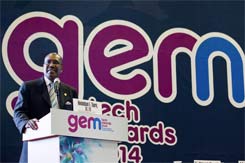
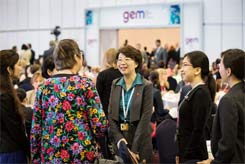
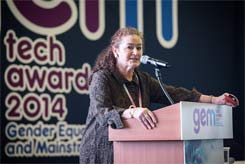
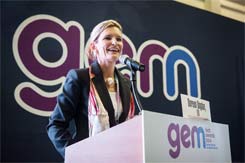
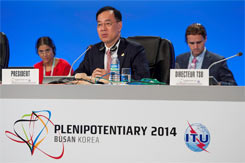
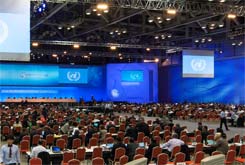
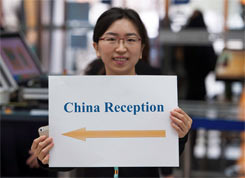
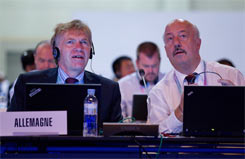
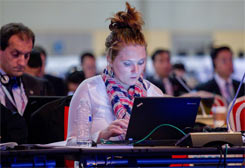
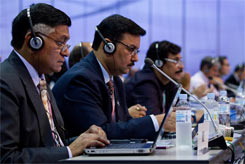
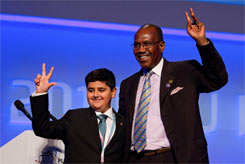
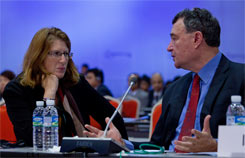
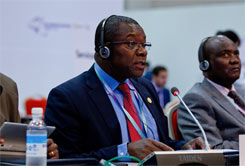
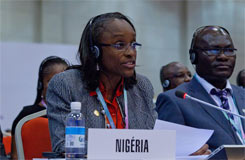
|
|
